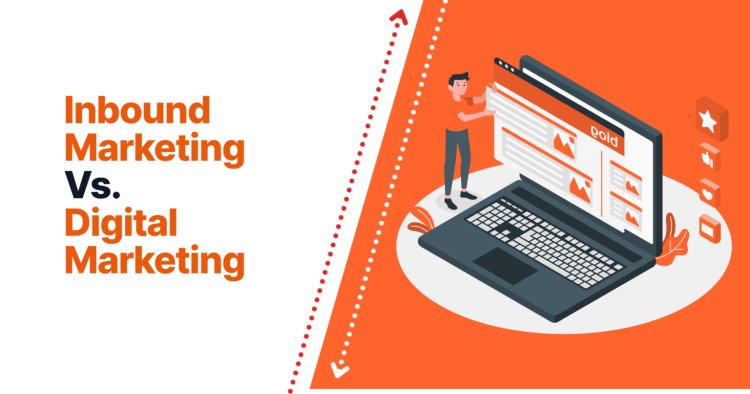What is Inbound Marketing versus Digital Marketing?
SEO Services, SEO Marketing, web development, web design.
Share this Post to earn Money ( Upto ₹100 per 1000 Views )


Introduction
Marketing has evolved significantly in recent years, with businesses adopting various strategies to attract and retain customers. Among these strategies, inbound marketing and digital marketing stand out as pivotal approaches. Understanding the distinctions between these two can empower businesses to implement more effective marketing campaigns.
Definition and Overview
Inbound Marketing
Inbound marketing focuses on attracting customers through valuable content and experiences tailored to them. This strategy emphasizes creating and sharing content that draws people to your website rather than outwardly pushing your products.
Digital Marketing
Digital marketing encompasses all marketing efforts that use the internet or electronic devices. It includes a wide range of tactics and channels such as social media, email marketing, search engine optimization (SEO), and pay-per-click (PPC) advertising.
Historical Context
Evolution of Inbound Marketing
Inbound marketing emerged as a response to the declining effectiveness of traditional outbound marketing techniques. As consumers gained more control over the information they consumed, businesses needed a new way to attract customers without interrupting their daily lives.
Evolution of Digital Marketing
Digital marketing has evolved with the growth of the internet and digital technologies. From the early days of email and banner ads to today’s sophisticated, data-driven strategies, digital marketing continues to expand its reach and capabilities.
Core Principles
Inbound Marketing Principles
- Attract: Drawing in the right people with valuable content and conversations that establish you as a trusted advisor.
- Engage: Presenting insights and solutions that align with their pain points and goals, increasing the likelihood of them buying from you.
- Delight: Providing help and support to empower your customers to find success with their purchase.
Digital Marketing Principles
- Reach: Utilizing various online channels to reach a broad audience.
- Engage: Interacting with potential customers through different forms of digital content.
- Convert: Turning engaged users into leads and customers through targeted social media marketing efforts.
Strategies and Tactics
Inbound Marketing Strategies
- Content Marketing: Creating and sharing valuable content to attract and engage an audience.
- SEO: Optimizing content to rank higher in search engine results.
- Social Media Engagement: Building relationships and engaging with the audience on social platforms.
- Email Marketing: Nurturing leads through targeted and personalized email campaigns.
Digital Marketing Strategies
- SEO and SEM: Enhancing website visibility in search engines.
- Content Marketing: Distributing valuable content across various digital channels.
- Social Media Marketing: Promoting content and engaging with users on social media platforms.
- PPC Advertising: Using paid ads to drive traffic and conversions.
Tools and Platforms
Tools for Inbound Marketing
- HubSpot: A comprehensive tool for managing inbound marketing campaigns.
- Moz: SEO Services software that helps in keyword research and site audits.
- Canva: A graphic design tool for creating visually appealing content.
- Google Analytics: Analyzing web traffic and user behavior.
Tools for Digital Marketing
- Google Ads: Managing PPC campaigns.
- Hootsuite: Managing social media posts and interactions.
- MailChimp: Email marketing automation and analytics.
- Ahrefs: Comprehensive SEO tool for backlink analysis and keyword research.
Benefits
Benefits of Inbound Marketing
- Cost-Effective: Lower costs compared to traditional outbound marketing.
- Builds Trust: Establishes your brand as a thought leader.
- Long-Term Results: Content created continues to attract leads over time.
- Improves SEO: High-quality content improves search engine rankings.
Benefits of Digital Marketing
- Broad Reach: Access to a global audience.
- Measurable Results: Track performance and ROI through analytics.
- Personalization: Tailor messages to specific audience segments.
- Flexibility: Adapt campaigns quickly based on real-time data.
Challenges and Limitations
Challenges in Inbound Marketing
- Time-Consuming: Requires a significant amount of time to create and distribute content.
- Content Saturation: Standing out in a crowded content market.
- Measurement: Difficulties in measuring the impact of content on sales.
Challenges in Digital Marketing
- Constant Changes: Rapid evolution of digital platforms and algorithms.
- Ad Blockers: Reduced effectiveness of ads due to ad-blocking software.
- Competition: High competition in digital advertising spaces.
- Data Privacy: Navigating privacy laws and data protection regulations.
Case Studies
Successful Inbound Marketing Campaigns
- HubSpot’s Blog: Demonstrates the power of consistent, high-quality content.
- Moz’s Whiteboard Fridays: Engaging video content that educates and builds authority.
- Buffer’s Social Media: Effective use of social media to engage with their audience.
Successful Digital Marketing Campaigns
- Coca-Cola’s Share a Coke: Personalized marketing through social media and PPC.
- Nike’s Digital Strategies: Integrating digital marketing across various platforms for maximum impact.
- Amazon’s Recommendation Engine: Using data-driven strategies to personalize marketing efforts.
Future Trends
Future of Inbound Marketing
- AI and Automation: Leveraging AI to personalize content and automate marketing tasks.
- Video Content: Increasing emphasis on video as a primary content format.
- Voice Search: Optimizing content for voice search as smart speakers become more popular.
Future of Digital Marketing
- Augmented Reality (AR): Enhanced user experiences through AR technology.
- Blockchain: Improving transparency and security in digital advertising.
- Omni-Channel Marketing: Seamless integration of various digital channels for a cohesive customer experience.
Comparative Analysis
Inbound Marketing vs. Digital Marketing
- Focus: Inbound marketing focuses on attracting customers with valuable content, while digital marketing covers a broader range of online marketing tactics.
- Approach: Inbound marketing is more about pull strategies (drawing in customers), whereas digital marketing includes both push (advertising) and pull strategies.
- Measurement: Digital marketing often provides more immediate, measurable results, while inbound marketing focuses on long-term relationship building.
Conclusion
Inbound marketing and digital marketing are both essential SEO Expert in today’s business landscape. While they overlap in many areas, understanding their unique aspects allows businesses to leverage them effectively. Combining the strengths of both approaches can lead to a more robust and successful marketing strategy.







